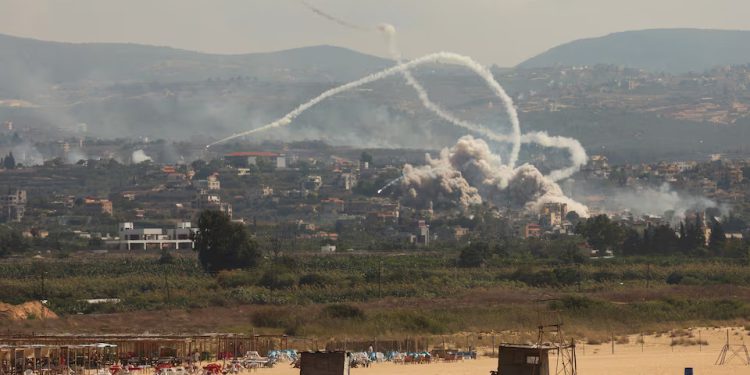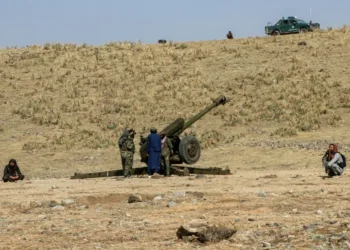War began when Palestinian militant group Hamas carried out the worst-ever attack on Israel, with Iran-backed groups around the region, chiefly Hezbollah, increasingly drawn into the violence.
On Monday, Israel said it had hit more than 300 Hezbollah sites with dozens of strikes, while Hezbollah said that it had targeted three sites in northern Israel.
The strikes on Lebanon, which also wounded more than 400 people according to the health ministry, were the deadliest in nearly a year of violence along the border with Israel.
“Enemy raids on southern towns and villages since this morning… killed 100 and injured more than 400,” the health ministry said in a statement, adding that “children, women and paramedics” were among the dead and wounded.
World powers have implored Israel and Hezbollah to pull back from the brink of all-out war, with the focus of violence shifting sharply from Israel’s southern front with Gaza to its northern border with Lebanon in recent days.
“We sleep and wake up to bombardment… That’s what our life has become,” said Wafaa Ismail, 60, a housewife from the south Lebanon village of Zawtar.
Israeli military spokesman Rear Admiral Daniel Hagari told people in Lebanon to avoid potential targets linked to Hezbollah as strikes would “go on for the near future”.
Hagari said Israel’s military “will engage in (more) extensive and precise strikes against terror targets which have been embedded widely throughout Lebanon”.
He told civilians “to immediately move out of harm’s way for their own safety”.
Hezbollah, a powerful political and military force in Lebanon, says it is acting in its fight along Lebanon’s southern border with Israel in support of its Palestinian ally Hamas, which is also backed by Iran.
In divided Lebanon, large parts of the south and east of the country, as well as the southern suburbs of capital city Beirut, are seen as strongholds of Hezbollah, where the group has historically wielded influence and built up services for its Shiite Muslim support base.
Ahead of the annual General Assembly in New York, United Nations chief Antonio Guterres warned of Lebanon becoming “another Gaza” and said it was “clear that both sides are not interested in a ceasefire” there.
Lebanon’s official National News Agency reported “more than 80 air strikes in half an hour” early Monday targeting the south of the country, as well as intense raids in the Bekaa Valley to the east.
The education minister said schools in targeted areas would close for two days.
Explosions around the ancient city of Baalbek in eastern Lebanon triggered flashes of fire and sent smoke billowing into the sky.
The Israeli military said Monday it would launch “large-scale” strikes in the Bekaa Valley in the east, warning residents of the area to move away from Hezbollah sites there.
Residents and local media said strikes also hit the outskirts of the coastal city Tyre.
NNA said Lebanese had received phone messages from Israel telling them “to quickly evacuate”.
Israeli Prime Minister Benjamin Netanyahu said Sunday that Israel has dealt “a series of blows on Hezbollah that it could have never imagined”, but Israeli leaders say they want their residents to return safely to border areas.
Hezbollah’s deputy chief, Naim Qassem, said the group was in a “new phase, namely an open reckoning” with Israel, and ready for “all military possibilities”.
Both were speaking after Hezbollah rocket attacks on northern Israel caused damage in the area of Haifa, a major city on Israel’s north coast.
Since the cross-border exchanges between Israel and Hezbollah began in October, tens of thousands of people on both sides have fled their homes.
An Israeli military official, who cannot be further identified under military rules, on Monday outlined the goals of the military operation.
It seeks to “degrade threats” from Hezbollah, push them back from the border, and then to destroy infrastructure built near the frontier by Hezbollah’s elite Radwan Force, the official said.
Lebanon’s Prime Minister Najib Mikati urged the UN and world powers to deter what he called Israel’s “plan that aims to destroy Lebanese villages and towns”.
US President Joe Biden, whose country is Israel’s main ally and weapons supplier, said his administration was “going to do everything we can to keep a wider war from breaking out”.
An Israeli air strike in Hezbollah’s southern Beirut stronghold on Friday killed the Radwan Force commander, Ibrahim Aqil, along with other commanders and civilians.
That followed coordinated communications device blasts on Tuesday and Wednesday that killed 39 people and wounded almost 3,000. Hezbollah blamed Israel.
Hezbollah said it targeted Israeli military production facilities and an air base in the Haifa area with rockets as “an initial response” on Sunday.
On Monday the group said it had again rocketed the “Rafael defence industry complexes” near Haifa, as well as two military positions.
“No country can live like this,” said Ofer Levy, 56, a customs officer, who lives on the edge of Haifa.
Hamas’s October 7 attack on Israel resulted in the deaths of 1,205 people, mostly civilians, according to an AFP tally based on Israeli official figures that include hostages killed in captivity.
Of the 251 hostages also seized by militants, 97 are still held in Gaza, including 33 the Israeli military says are dead.
Israel’s retaliatory military offensive has killed at least 41,431 people in Gaza, most of them civilians, according to figures provided by the Hamas-run territory’s health ministry. The UN has described the figures as reliable.




















